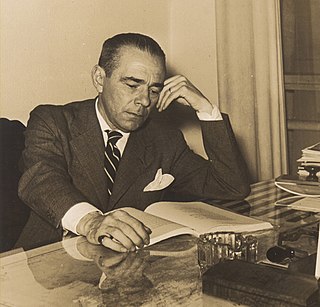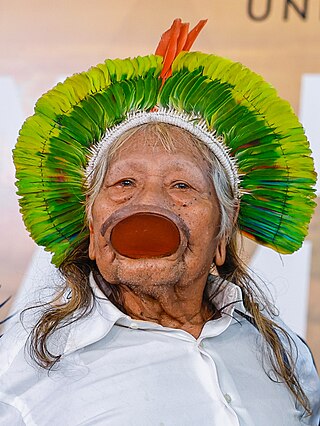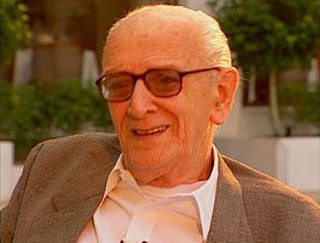
Stefan Zweig was an Austrian writer. At the height of his literary career, in the 1920s and 1930s, he was one of the most widely translated and popular writers in the world.

Brazilian Integralism was a political movement in Brazil, created in October 1932. Founded and led by Plínio Salgado, a literary figure somewhat famous for his participation in the 1922 Modern Art Week, the movement had adopted some characteristics of European mass movements of those times, specifically of Italian fascism, but distanced itself from Nazism because Salgado himself did not support racism. He believed that every person of every race should unite under the Integralist flag. Despite the movement's slogan "Union of all races and all peoples", members and leaders like Gustavo Barroso held anti-Semitic views. The name of the party created to support its doctrine was Brazilian Integralist Action. The reference to Integralism mirrored a traditionalist movement in Portugal, the Lusitanian Integralism. For its symbol, the AIB used a flag with a white disk on a royal blue background, with an uppercase sigma (Σ) in its center.

Katherine Marie Helmond was an American actress. Over an acting career spanning six decades, she was best known for her starring role as Jessica Tate on the sitcom Soap (1977–1981) and her co-starring role as Mona Robinson on Who's the Boss? (1984–1992). Helmond also played Doris Sherman on Coach (1995–1997) and Lois Whelan on Everybody Loves Raymond (1996–2004). She also appeared as a guest on several talk and variety shows.
Leo is the Latin word for lion. It most often refers to:

Rachel de Queiroz was a Brazilian author, translator and journalist.
Latin American cinema refers collectively to the film output and film industries of Latin America. Latin American film is both rich and diverse, but the main centers of production have been Argentina, Brazil and Mexico. Latin American cinema flourished after the introduction of sound, which added a linguistic barrier to the export of Hollywood film south of the border.

Alberto de Almeida Cavalcanti was a Brazilian-born film director and producer. He was often credited under the single name "Cavalcanti".

The Constitutionalist Revolution of 1932 is the name given to the uprising of the population of the Brazilian state of São Paulo against the Brazilian Revolution of 1930 when Getúlio Vargas assumed the nation's presidency; Vargas was supported by the people, the military and the political elites of Minas Gerais, Rio Grande do Sul and Paraíba. The movement grew out of local resentment from the fact that Vargas ruled by decree, unbound by a Constitution, in a provisional government. The 1930 Revolution also affected São Paulo by eroding the autonomy that states enjoyed during the term of the 1891 Constitution and preventing the inauguration of the governor of São Paulo, Júlio Prestes, who had been elected president of Brazil in 1930, while simultaneously overthrowing President Washington Luís, who was governor of São Paulo from 1920 to 1924. These events marked the end of the First Brazilian Republic.
A list of films produced in Brazil ordered by year and split onto separate pages by decade. For an alphabetical list of films currently on Wikipedia see Category:Brazilian films
The 1932 International Lawn Tennis Challenge was the 27th edition of what is now known as the Davis Cup. 22 teams would enter the Europe Zone; while 8 would enter the Americas Zone, 5 in North America and 3 in South America.

Tarzan and the Great River is a 1967 adventure film starring Mike Henry in his second of three film appearances as Tarzan. The twenty-seventh and penultimate film of the Tarzan film series that began with 1932's Tarzan the Ape Man, the film was produced by Sy Weintraub and Steve Shagan, written by Bob Barbash, and directed by Robert Day. Released on September 1, 1967, it was followed by Tarzan and the Jungle Boy in 1968.

Roberto Farias was a Brazilian film director, producer and screenwriter. He directed 15 films during his career. His 1982 film Pra Frente, Brasil was entered into the 33rd Berlin International Film Festival. Farias' brother Reginaldo Faria is also a film director and actor.

Guilherme de Andrade e Almeida was a lawyer, journalist, film critic, poet, essayist and Brazilian translator. He helped popularize the Japanese poem style, haiku, in Brazil.

Raoni Metuktire, also known as Chief Raoni or Ropni, is an Indigenous Brazilian leader and environmentalist. He is a chief of the Kayapo people, a Brazilian Indigenous group from the plain lands of the Mato Grosso and Pará in Brazil, south of the Amazon River and along Xingu River and its tributaries. He is internationally famous as a living symbol of the fight for the preservation of the Amazon rainforest and indigenous culture.

João Lutfi, known professionally as Sérgio Ricardo, was a Brazilian film director and composer. He directed five films between 1964 and 1974.

Antônio Abujamra was a Brazilian theatre and television director and actor. Having majored in journalism and philosophy at the Pontifícia Universidade Católica do Rio Grande do Sul in 1957, he started a career as a theatre critic while he directed and acted in his own plays at the university theatre. Professionally, he made his debut as a theatre director in 1961, and as an actor in 1987, acting in both theatre and television. In 1989, he gained national fame for his role as Ravengar in Rede Globo's telenovela Que Rei Sou Eu?, which became his best known role. In that same year, Abujamra won the Best Actor award at the Gramado Film Festival for his role in the film Festa. From 2000 onward, he was the presenter on TV Cultura's interview program Provocações. His son André Abujamra is a score composer, while his niece Clarisse Abujamra, is also an actress.

Events in the year 1932 in Brazil.

Mário Lago OMC was a Brazilian lawyer, poet, broadcaster, composer and actor.
















